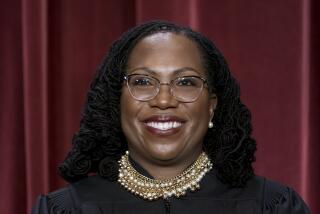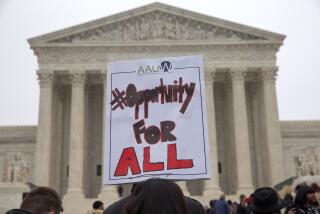Erasing Racism in Jury Selection : Hold defense to same standard as prosecution
- Share via
When the U.S. Supreme Court agreed recently to decide whether a white criminal defendant may exclude African-Americans from his jury, we hope that meant that the high court plans to take up where it left off last term in assuring that the composition of juries is racially unbiased.
The only way to do that is to insist that both the defense and prosecution play fair and not exclude jurors because of their race.
PRECEDENTS: In two significant decisions last term, the court may have foreshadowed the outcome of Georgia vs. McCollum, which will be heard later this term. In one case--Edmonson vs. Leesville Concrete Co.--the court held that a private litigant in a civil case may not use peremptory challenges to exclude jurors on account of race. Peremptories are used to dismiss potential jurors from a trial panel without explanation. Until recently their use was largely unfettered; both sides commonly availed themselves of these challenges to shape a jury they believed would be sympathetic to their case.
But the court ruled in Edmonson that the exclusion of potential jurors solely because of race violates the equal-protection clause of the 14th Amendment. “Few places are a more real expression of the authority of the government than a courthouse . . . . Race discrimination within the courtroom . . . offends the dignity of persons and the integrity of the courts.”
The court’s ruling months before that--in Powers vs. Ohio--is even closer to the issue. In the Powers ruling the court held that a criminal defendant may object to a prosecutor’s race-based peremptory exclusions whether or not the defendant and the excluded jurors are the same race. The Powers decision builds directly on a 1986 decision prohibiting the state from using the jury selection process in a racially biased way.
THE ISSUE: In the upcoming McCollum case, the court will decide whether the defense can exclude potential jurors based on race. The case involves the prosecution of three white owners of a dry-cleaning establishment in Albany, Ga., charged with assaulting two black customers. The state attorney general asked the trial judge to bar the defendants from using their peremptory challenges to exclude blacks from the jury. The trial judge refused and the Georgia Supreme Court, in a pretrial ruling last July, upheld that decision.
The outcome of the McCollum case is by no means assured--Justice Antonin Scalia and Chief Justice William H. Rehnquist strongly dissented from both decisions last term. They argued that that the court has never held that jurors have an equal-protection right “not to be excluded from a particular case.” Moreover, they asserted in the Edmonson case--involving a civil trial--”not everything that happens in a courtroom is a state action . . . . The government erects the platform; it does not thereby become responsible for all that occurs upon it.”
Perhaps, but when the “platform” the state erects can support systematic racial discrimination, that’s wrong. It’s really that simple.
More to Read
Sign up for Essential California
The most important California stories and recommendations in your inbox every morning.
You may occasionally receive promotional content from the Los Angeles Times.










